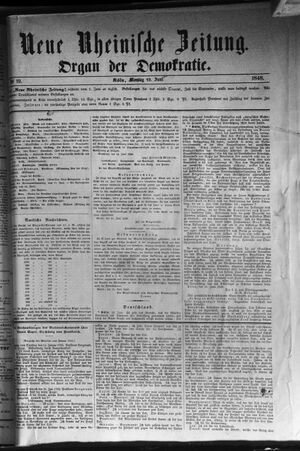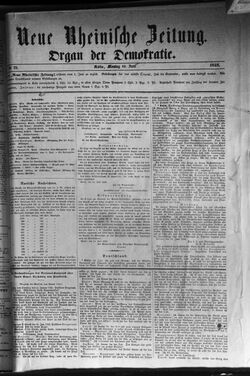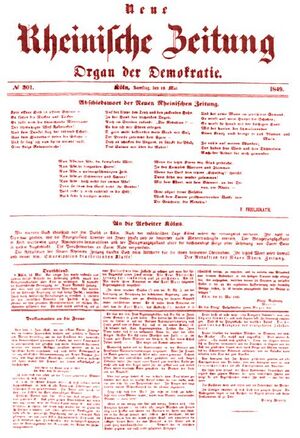Neue Rheinische Zeitung
The Neue Rheinische Zeitung: Organ der Demokratie ("New Rhenish Gazette: Organ of Democracy") was a radical daily newspaper associated with the Communist League published by Karl Marx in Cologne, Prussia between 1 June 1848 and 19 May 1849 at the height of the German Revolutions of 1848. The name refers to the Rheinische Zeitung, also associated with Marx, which had been suppressed by the Prussian government in 1843. The Neue Rheinische Zeitung became one of the most important daily newspapers of the German bourgeois-democratic revolution. Along with Marx, the editor-in-chief, the paper was edited by Friedrich Engels, Heinrich Bürgers, Ernst Dronke, George Weerth, and Wilhelm and Ferdinand Wolff.
History
Establishment
The Neue Rheinische Zeitung: Organ der Demokratie ("New Rhenish Newspaper: Organ of Democracy") was founded 1 June 1848 in Cologne and named after the city's location on the Rhine river and as part of the Rhineland region. The paper was established by Karl Marx, Frederich Engels, and leading members of the Communist League immediately upon the return of Marx and Engels to Germany following the outbreak of the 1848 Revolution.[1] The paper's editorial staff included Joseph Weydemeyer, with Marx serving as editor-in-chief. The paper was named after an earlier newspaper edited by Karl Marx in Cologne from 1842 to 1843, the Rheinische Zeitung.[1] The paper had the subtitle "Organ of Democracy," referring not to the establishment of parliamentary democracy, but to the revolutionary "Democratic front" which included the progressive petty bourgeoisie, the working class, and the peasantry.[1] The paper was financed through the sale of shares of stock, contributions and loans, and paid advertising.[1] The paper was produced as a 4-page broadsheet, with the use of occasional special supplements.[1]
Development
Circulation of the paper ranged from 3,000 to 6,000 copies per issue,[2] a number far in excess of the membership of the Communist League itself, which may have had between 200 and 300 participants.[3] This effectively rendered the publication into what historian Tatyana Vasilyeva has called "the leading centre of the Communist League, directing the political activity of its members throughout Germany during the revolutionary period."[4]
A total of 301 editions of the Neue Rheinische Zeitung (NRZ) were produced during the course of its existence.[1] To these Marx himself contributed a total of not fewer than 80 articles over the course of its existence.[5] Since editorial contributions to the NRZ were unsigned and handwritten manuscripts have not survived, a precise count is impossible, however.[6]
Political line
The Neue Rheinische Zeitung (NRZ) was outspoken in its criticism of Prussia and Austria for Monarchist counter-revolution,[7] and actively agitated for their defeat. The paper was also critical of the willingness of the liberal bourgeoisie to compromise with Monarchist forces — policies which Marx and his comrades believed would have negative impacts upon the German revolution.[7][2]
More than three decades after the publication's termination, Marx's close associate Frederick Engels recalled that the NRZ had a political program with two main points: "a single, indivisible, democratic German republic, and War with Russia, including the restoration of Poland."[8] With respect to foreign affairs, Engels recalled that the NRZ sought "to support every revolutionary people and to call for a general war of revolutionary Europe against the mighty bulwark of European reaction — Russia."[9]
This policy was intended to undermine both the authority of Prussia and Tsarist Russia, both considered reactionary and militaristic powers, with war against Russia seen as a necessary prerequisite for establishment of a unified and democratic Germany.[7][10] Marx and Engels believed that "if Germany could be successfully brought to make war against Russia, it would be the end for the Habsburgs and Hohenzollerns and the revolution would triumph along the whole line."[11]
The tone of the newspaper was described by Engels as "by no means solemn, serious, or enthusiastic," instead treating political opponents with "mockery and derision" in a manner entertaining to readers.[10] The paper sought to foster the idea that the German events of the spring of 1848 were the starting point of a long revolutionary process akin to the French Revolution of 1789-1794.[12] The paper attempted to undermine the notion that the formal resolutions of various "National Assemblies" were capable of changing state policy in any fundamental way.[12]
Throughout its existence the NRZ was persecuted by the Prussian government, which brought lawsuits against it charging the NRZ with having "slandered" government officials.[1] As the revolutionary upsurge of 1848 ebbed, the government's hindrance of the publication became steadily more effective, culminating in Karl Marx's expulsion from Germany — a move which effectively killed the paper.[1]
Suppression and final issue
On 2 March 1849, Prussian soldiers came to Marx's home to arrest one of the writers. Marx refused to turn over the writer, and the soldiers eventually left.
On 16 May 1849 Marx received an official note from the royal government declaring:
The tendency of the Neue Rheinische Zeitung to provoke in its readers contempt for the present government, and incite them to violent revolutions and the setting up of a social republic has become stronger in its latest pieces. The right of hospitality which he so disgracefully abused, is therefore to be withdrawn from its Editor-in-Chief, Dr. Karl Marx, and since he has not obtained permission to prolong his stay in these states he is ordered to leave them within 24 hours. If he should not comply with this demand, he is to be conveyed across the border.[13]
The Zeitung responded with the famous "red issue", a final rebuttal in which Marx and the other editors castigated the government for this suppression of their freedom of speech. Marx made very brief remarks criticizing the hypocritical pretext that the paper's language had only recently gotten "stronger" by citing issues from months or even years prior which held the same view, and then ended with the following:
Did we not speak plainly and clearly enough for those dullards who failed to see the 'red' thread running through all our comments and reports on the European movement? [...] Did we therefore have to advance our social republican tendency only in the "last pieces" of the Neue Rheinische Zeitung? Did you not read our articles about the June revolution, and was not the essence of the June revolution the essence of our paper?
Why then your hypocritical phrases, your attempt to find an impossible pretext?
We have no compassion and we ask no compassion from you. When our turn comes, we shall not make excuses for the terror. But the royal terrorists, the terrorists by the grace of God and the law, are in practice brutal, disdainful, and mean, in theory cowardly, secretive, and deceitful, and in both respects disreputable.
The Prussian official piece of paper goes even to the absurd length of speaking about the "right of hospitality which was disgracefully abused" by Karl Marx, the Editor-in-Chief of the Neue Rheinische Zeitung.
The right of hospitality which the insolent intruders, the anterior Russians (Borussians)[a], forced upon us, inhabitants of the Rhineland, on our own land — this hospitality was indeed "disgracefully" abused by the Neue Rheinische Zeitung. We believe that we have thereby rendered a service to the Rhine Province. We have saved the revolutionary honor of our homeland. From now on the Neue Preussische Zeitung alone will enjoy the full right of citizenship in the Rhine Province.
In parting we should like to remind our readers of the words printed in the first issue we published in January:
The table of contents for 1849 reads: Revolutionary rising of the French working class, world war.
And in the East, a revolutionary army made up of fighters of all nationalities already confronts the alliance of the old Europe represented by the Russian army, while from Paris comes the threat of a "red republic".
Notes
- ↑ "Prussians"
References
- ↑ 1.0 1.1 1.2 1.3 1.4 1.5 1.6 1.7 Hal Draper, "Neue Rheinische Zeitung: Organ der Demokratie," in The Marx-Engels Glossary: Glossary to the Chronicle and Register, and Index to the Glossary: Volume 3 of the Marx-Engels Cyclopedia. New York: Schocken Books, 1986; pp. 150-151.
- ↑ 2.0 2.1 James G. Chastain, "Neue Rheinische Zeitung," Encyclopedia of 1848 Revolutions, www.ohio.edu/
- ↑ Tatyana Vasilyeva, "Preface" to Karl Marx and Frederick Engels, Collected Works: Volume 7: Marx and Engels, 1848. New York: International Publishers, 1977; pg. xviii.
- ↑ Vasilyeva, "Preface" to Marx-Engels Collected Works: Vol. 7, pg. xix.
- ↑ David McLellan, The Thought of Karl Marx: An Introduction. New York: Harper and Row, 1971; pg. 42.
- ↑ Vasilyeva, "Preface" to Marx-Engels Collected Works: Vol. 7, pp. xxxii-xxxiii.
- ↑ 7.0 7.1 7.2 Neue Rheinische Zeitung at the Great Soviet Encyclopedia.
- ↑ Engels, Friedrich (1884). "Marx and the ''Neue Rheinische Zeitung'' (1848-49)". Available online at an archived version of the Marxists Internet Archive
- ↑ Engels, "Marx and the Neue Rheinische Zeitung (1848-49)," pg. 126.
- ↑ 10.0 10.1 Engels, "Marx and the Neue Rheinische Zeitung (1848-49)," pg. 124.
- ↑ Engels, "Marx and the Neue Rheinische Zeitung (1848-49)," pg. 127.
- ↑ 12.0 12.1 Engels, "Marx and the Neue Rheinische Zeitung (1848-49)," pg. 125.
- ↑ Marx, Karl (1849). Final issue of the ''Neue Rheinische Zeitung''. Available online at the Marxists Internet Archive
External links
- Articles by Karl Marx and Frederick Engels in the Neue Rheinische Zeitung
- Neue Rheinische Zeitung at the Great Soviet Encyclopedia
- Articles from the Neue Rheinische Zeitung 1848-49, a compilation of articles by Marx and Engels in PDF format
- Neue Rheinische Zeitung in the Encyclopedia of Revolutions of 1848


